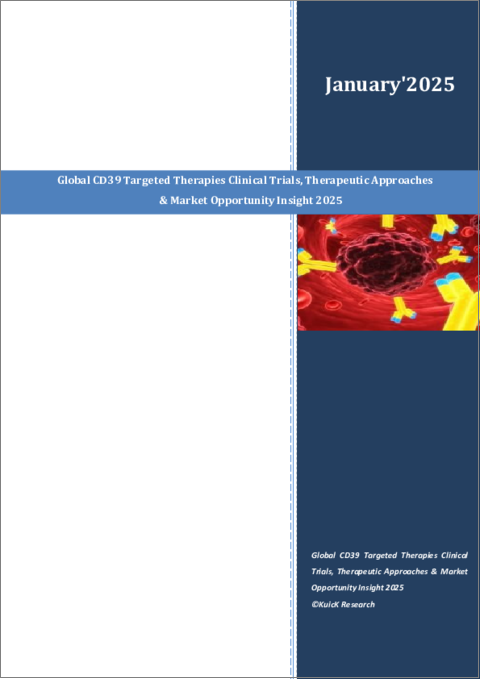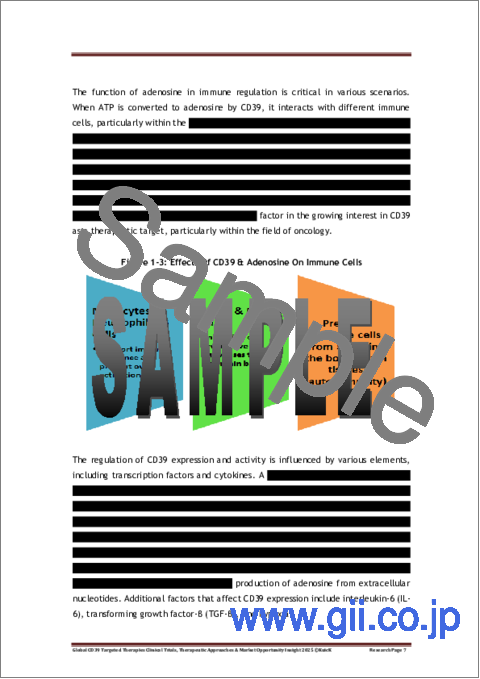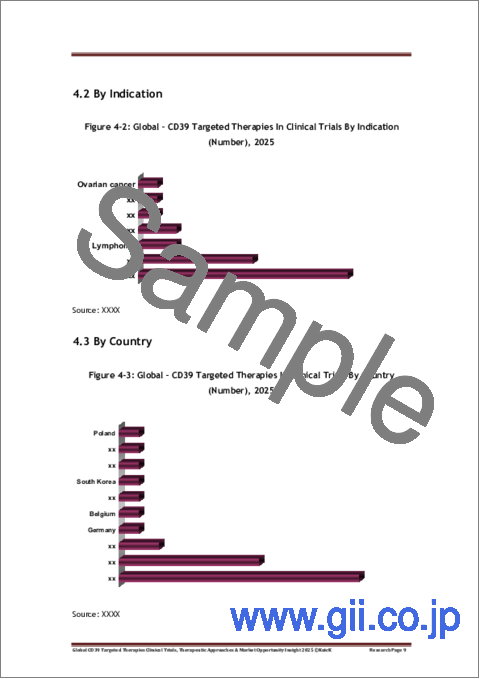|
|
市場調査レポート
商品コード
1636799
世界のCD39標的療法の臨床試験、治療アプローチ、市場の機会:2025年Global CD39 Targeted Therapies Clinical Trials, Therapeutic Approaches & Market Opportunity Insight 2025 |
||||||
|
|||||||
| 世界のCD39標的療法の臨床試験、治療アプローチ、市場の機会:2025年 |
|
出版日: 2025年01月01日
発行: KuicK Research
ページ情報: 英文 100 Pages
納期: 即日から翌営業日
|
全表示
- 概要
- 図表
- 目次
CD39標的療法は、さまざまな疾患における免疫応答を調節する有望な戦略として浮上しています。CD39は、プリン作動性シグナル伝達経路に影響を与える重要なエクトヌクレオチダーゼとして機能し、それによって免疫の活性化と抑制の間の均衡を調節しています。ATPをAMPに変換し、さらにCD73によってアデノシンに変換されることにより、CD39は免疫抑制的な微小環境を確立するのに役立っています。この環境は特に腫瘍に有利ですが、慢性感染症や自己免疫疾患でも役割を果たしています。CD39の活性を阻害することで、免疫機能を回復させ、このような状況における患者の予後を改善できる可能性があります。
腫瘍学の領域では、腫瘍微小環境(TME)における免疫抑制に対するCD39の寄与は十分に確立されています。腫瘍はしばしばCD39-CD73-アデノシン軸を利用して免疫監視を回避し、その結果、免疫細胞が疲弊して抗腫瘍反応が低下します。制御性T細胞(Treg)やCD8+T細胞上のCD39レベルの上昇は、様々な悪性腫瘍において予後不良と関連しています。IPH5201のようなCD39を標的とするモノクローナル抗体を用いることで、免疫系を再活性化し、腫瘍細胞とより効果的に闘うことができます。Innate PharmaとAstraZenecaによって開発されているIPH5201は、固形がん患者の免疫反応を増強するために、免疫チェックポイント阻害剤(ICI)と併用して現在研究中です。
がんに加えて、CD39を標的とする治療法は、他の疾患、特に慢性ウイルス感染症、自己免疫疾患、敗血症などにも対応できる可能性があります。HIV、結核、シャーガス病などの慢性感染症では、CD39は免疫の疲弊と抑制に関与しており、効果的な免疫応答を阻害します。CD39を阻害することで、免疫機能不全を回復させ、病原体を排除する身体の能力を向上させる可能性があります。免疫系が過剰に活性化する自己免疫疾患では、CD39を標的とすることで、組織損傷を回避するのに不可欠な制御性T細胞の抑制機能を高め、均衡を取り戻すことができるかもしれません。
単球やマクロファージにおけるCD39の発現は炎症を制御する上で重要であるため、CD39を標的とする治療の可能性は敗血症にも及びます。敗血症においては、感染症を効果的に管理しながら組織傷害を軽減するために、バランスのとれた免疫反応を達成することが重要です。CD39の活性を阻害することにより、治療的介入は過剰な炎症を抑制し、免疫の恒常性を回復させ、この重篤な病態に対処する新しい戦略を提示することができます。
CD39を標的とした治療法の臨床的進歩はまだ初期段階にあり、いくつかの候補が臨床試験、特に第2相試験を進行中です。その中でもIPH5201は有力候補として際立っており、前臨床試験と初期臨床試験の両方で有望な結果を示しています。これらの抗体は、がん領域だけでなく、CD39が免疫調節に重要な役割を果たしているさまざまな慢性疾患でも評価されています。CD39に注目することで、これらの治療薬は免疫抑制や機能不全を特徴とするシナリオにおいて免疫反応を強化しようとするものです。
将来的には、CD39を標的とする治療薬の潜在的な用途は広範囲に及びます。抗CD39抗体と免疫チェックポイント阻害剤や抗ウイルス剤など他の治療法との併用は、相乗効果をもたらし、免疫応答を増強する機会を提供します。それにもかかわらず、特に様々な疾患や患者層におけるCD39の状況に依存した機能に関する課題が残っています。これらの治療法を安全かつ効果的に実施するためには、免疫の活性化と抑制のバランスを正確にとることが不可欠です。臨床試験が進み、さらなるデータが収集されるにつれて、CD39を標的とする治療法は個別化医療の基本的な構成要素として登場し、免疫応答を正確かつ制御することで様々な疾患に効果的に対処できるようになるかもしれません。
当レポートは、世界のCD39標的療法市場について調査し、市場の概要とともに、薬剤動向、臨床試験動向、地域別動向、および市場に参入する企業の競合情勢などを提供しています。
目次
第1章 CD39標的療法のイントロダクション
第2章 CD39標的療法の作用機序
- CD39阻害
- CD39アゴニズム
第3章 現在のCD39標的療法アプローチ
- 抗体
- 核酸治療薬
- 低分子阻害剤
第4章 世界のCD39標的療法の臨床試験の概要
- 企業別
- 適応症別
- 国別
- 相別
第5章 CD39標的療法の臨床試験に関する企業、国、適応症、相別の考察
- 研究
- 前臨床
- 第I相
- 第II相
第6章 世界のCD39標的療法市場の動向と発展
- 現在の市場の概略
- 将来の市場機会
第7章 適応症別のCD39標的療法の役割:臨床開発と連携
- がん
- 自己免疫疾患および炎症性疾患
- 心血管疾患
- 感染症
第8章 CD39標的治療技術プラットフォーム
第9章 世界のCD39標的治療市場力学
- 市場促進要因と機会
- 市場の課題と抑制要因
第10章 競合情勢
- Adimab
- Arcus Biosciences
- Biotheus
- BrightPath Biotherapeutics
- Elpiscience Biopharmaceuticals
- Innate Pharma
- Orega Biotech
- OriCell Therapeutics
- Secarna Pharmaceuticals
- Trishula Therapeutics
List of Figures
- Figure 1-1: CD39/CD73/A2AR Pathway
- Figure 1-2: Role Of Adenosine In Immune Regulation
- Figure 1-3: Effects Of CD39 & Adenosine On Immune Cells
- Figure 1-4: Discovery Of CD39 & Developmental Milestones
Figure 2 -1: CD39 Inhibition - Mechanism
- Figure 2-2: CD39 Agonism - Mechanism
- Figure 3-1: TTX-030: Mechanism of Action
- Figure 3-2: Oligonucleotides - Benefits
- Figure 4-1: Global - CD39 Targeted Therapies In Clinical Trials By Company (Number), 2025
- Figure 4-2: Global - CD39 Targeted Therapies In Clinical Trials By Indication (Number), 2025
- Figure 4-3: Global - CD39 Targeted Therapies In Clinical Trials By Country (Number), 2025
- Figure 4-4: Global - CD39 Targeted Therapies In Clinical Trials By Phase (Number), 2025
- Figure 7-1: Role Of CD39 In Cancer
- Figure 7-2: ARC-25 Phase I/Ib (NCT05891171) Study - Initiation & Completion Year
- Figure 7-3: MATISSE Phase II (NCT05742607) Study - Initiation & Completion Year
- Figure 7-4: ELTIVATE/TTX-030-003 Phase II (NCT06119217) Study - Initiation & Completion Year
- Figure 7-5: ES014-IIT-01 Phase II (NCT06543056) Study - Initiation & Completion Year
- Figure 7-6: Role Of CD39 In Modulating Inflammatory Responses
- Figure 7-7: Role Of CD39 In Cardiovascular Diseases
- Figure 7-8: Role Of CD39 In Infections
- Figure 8-1: Secarna Pharmaceuticals - OligoCreator Platform
- Figure 8-2: Adimab - Proprietary Platform
- Figure 8-3: Sensei Biotherapeutics - TMAb Platform
- Figure 9-1: Global CD39 Targeted Therapies Market - Market Drivers & Opportunities
- Figure 9-2: Global CD39 Targeted Therapies Market - Market Challenges & Restraints
Global CD39 Targeted Therapies Clinical Trials, Therapeutic Approaches & Market Opportunity Insight 2025 Report Highlights:
- First CD39 Targeted Therapy Approval Expected By 2029
- CD39 Targeted Therapies In Clinical Trials: > 15 Therapies
- CD39 Inhibitors Clinical Trials Insight By Company, Country, Indication and Phase
- CD39 Targeted Therapy Research and Development Trends By Indication
- CD39 Targeted Therapies Proprietary Technologies Platforms By Company
CD39 targeting therapies are emerging as a promising strategy for modulating immune responses in a range of diseases. CD39 serves as a vital ectonucleotidase that influences the purinergic signaling pathway, thereby regulating the equilibrium between immune activation and suppression. By converting ATP into AMP, which is further transformed into adenosine by CD73, CD39 is instrumental in establishing an immunosuppressive microenvironment. This environment is particularly advantageous for tumors but also plays a role in chronic infections and autoimmune diseases. Inhibiting CD39 activity may restore immune functionality and enhance patient outcomes in these contexts.
In the realm of oncology, the contribution of CD39 to immune suppression within the tumor microenvironment (TME) is well-established. Tumors frequently utilize the CD39-CD73-adenosine axis to evade immune surveillance, resulting in immune cell exhaustion and diminished anti-tumor responses. Elevated levels of CD39 on regulatory T cells (Tregs) and CD8+ T cells have been associated with unfavorable prognoses in various malignancies. By employing monoclonal antibodies that target CD39, such as IPH5201, it is possible to reactivate the immune system to more effectively combat tumor cells. IPH5201, which is being developed by Innate Pharma and AstraZeneca, is currently under investigation in conjunction with immune checkpoint inhibitors (ICIs) to enhance the immune response in patients with solid tumors.
In addition to cancer, CD39-targeting therapies show considerable potential for addressing other diseases, particularly chronic viral infections, autoimmune disorders, and sepsis. In the context of chronic infections like HIV, tuberculosis, and Chagas disease, CD39 is implicated in immune exhaustion and suppression, which obstructs effective immune responses. By inhibiting CD39, there is a possibility of reversing immune dysfunction and improving the body's capacity to eliminate pathogens. In autoimmune disorders, where there is an overactivation of the immune system, the targeting of CD39 may aid in reestablishing equilibrium by enhancing the inhibitory function of regulatory T cells, which are vital for averting tissue damage.
The therapeutic promise of targeting CD39 also encompasses sepsis, as CD39 expression on monocytes and macrophages is instrumental in regulating inflammation. In the context of sepsis, achieving a balanced immune response is crucial to mitigate tissue injury while effectively managing infection. By inhibiting the activity of CD39, therapeutic interventions could diminish excessive inflammation and restore immune homeostasis, presenting a novel strategy for addressing this critical condition.
The clinical advancement of therapies aimed at CD39 is still in its nascent phase, with several candidates progressing through clinical trials, particularly in Phase 2. Among these, IPH5201 stands out as a leading candidate, demonstrating encouraging outcomes in both preclinical and early-phase clinical investigations. These antibodies are being assessed not only in oncology but also across a range of chronic conditions where CD39 plays a significant role in immune regulation. By focusing on CD39, these therapies seek to bolster immune responses in scenarios characterized by immune suppression or dysfunction.
Looking forward, the potential uses of CD39-targeting therapies are extensive. The integration of anti-CD39 antibodies with other treatment modalities, such as immune checkpoint inhibitors or antiviral therapies, presents the opportunity for synergistic effects, thereby enhancing the immune response. Nonetheless, challenges persist, particularly concerning the context-dependent function of CD39 across various diseases and patient demographics. Achieving a precise balance between immune activation and suppression will be essential for the safe and effective implementation of these therapies. As clinical trials advance and additional data is collected, therapies targeting CD39 may emerge as a fundamental component of personalized medicine, effectively addressing various diseases through the precise and controlled modulation of immune responses.
Table of Contents
1. Introduction To CD39 Targeting Therapies
- 1.1 Overview
- 1.2 Role of CD39 & Emergence As Therapeutic Target
- 1.3 Discovery of CD39 & Development Of Targeting Therapies
2. CD39 Targeting Therapies Mechanism Of Action
- 2.1 CD39 Inhibition
- 2.2 CD39 Agonism
3. Current CD39 Targeting Therapy Approaches
- 3.1 Antibodies
- 3.2 Nucleic Acid Therapeutics
- 3.3 Small Molecule Inhibitors
4. Global CD39 Targeted Therapies Clinical Trials Overview
- 4.1 By Company
- 4.2 By Indication
- 4.3 By Country
- 4.4 By Phase
5. CD39 Targeted Therapies Clinical Trials Insight By Company, Country, Indication & Phase
- 5.1 Research
- 5.2 Preclinical
- 5.3 Phase I
- 5.4 Phase II
6. Global CD39 Targeting Therapy Market Trends & Developments
- 6.1 Current Market Outline
- 6.2 Future Market Opportunities
7. Role Of CD39 Targeting Therapies By Indication: Clinical Development & Collaborations
- 7.1 Cancer
- 7.2 Autoimmune & Inflammatory Diseases
- 7.3 Cardiovascular Diseases
- 7.4 Infections
8. CD39 Targeted Therapies Technology Platforms
- 8.1 OligoCreator & LNAplus Platforms - Secarna Pharmaceuticals
- 8.2 Unnamed Platforms - Biotheus
- 8.3 Unnamed Platform - Adimab
- 8.4 OriAb Antibody Discovery Platform - Oricell Therapeutics
- 8.5 TMAb Platform - Sensei Biotherapeutics
9. Global CD39 Targeted Therapies Market Dynamics
- 9.1 Market Drivers & Opportunities
- 9.2 Market Challenges & Restraints
10. Competitive Landscape
- 10.1 Adimab
- 10.2 Arcus Biosciences
- 10.3 Biotheus
- 10.4 BrightPath Biotherapeutics
- 10.5 Elpiscience Biopharmaceuticals
- 10.6 Innate Pharma
- 10.7 Orega Biotech
- 10.8 OriCell Therapeutics
- 10.9 Secarna Pharmaceuticals
- 10.10 Trishula Therapeutics






